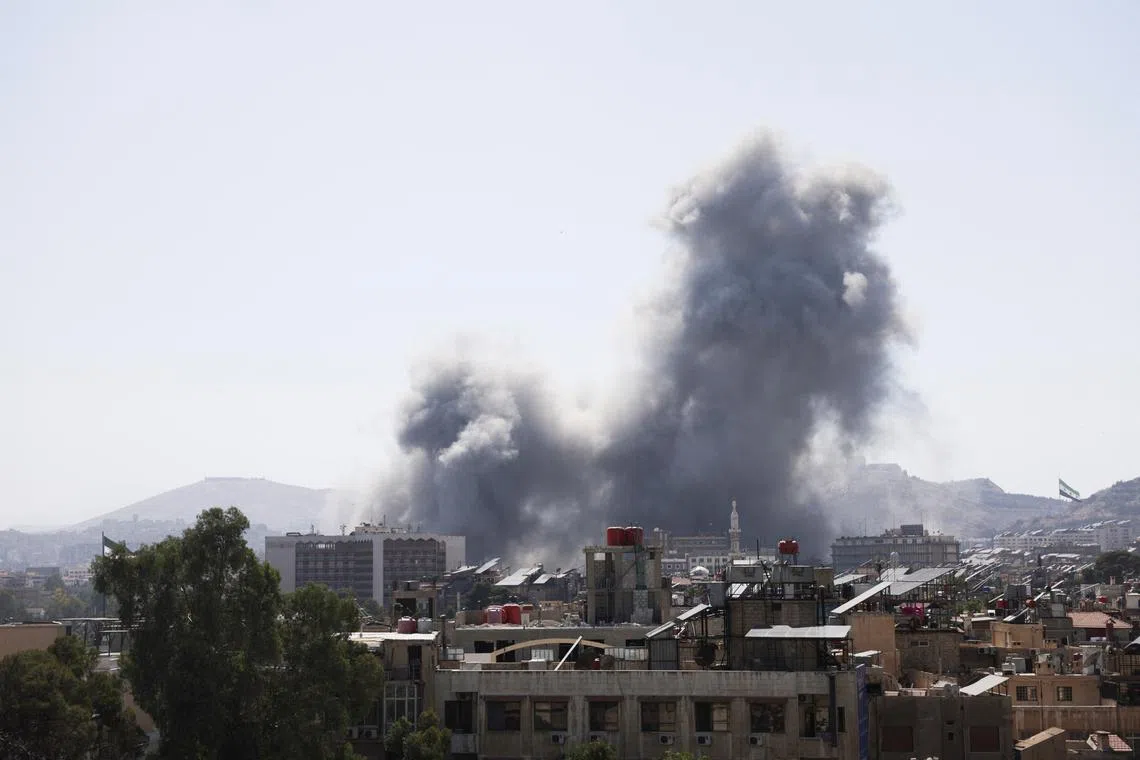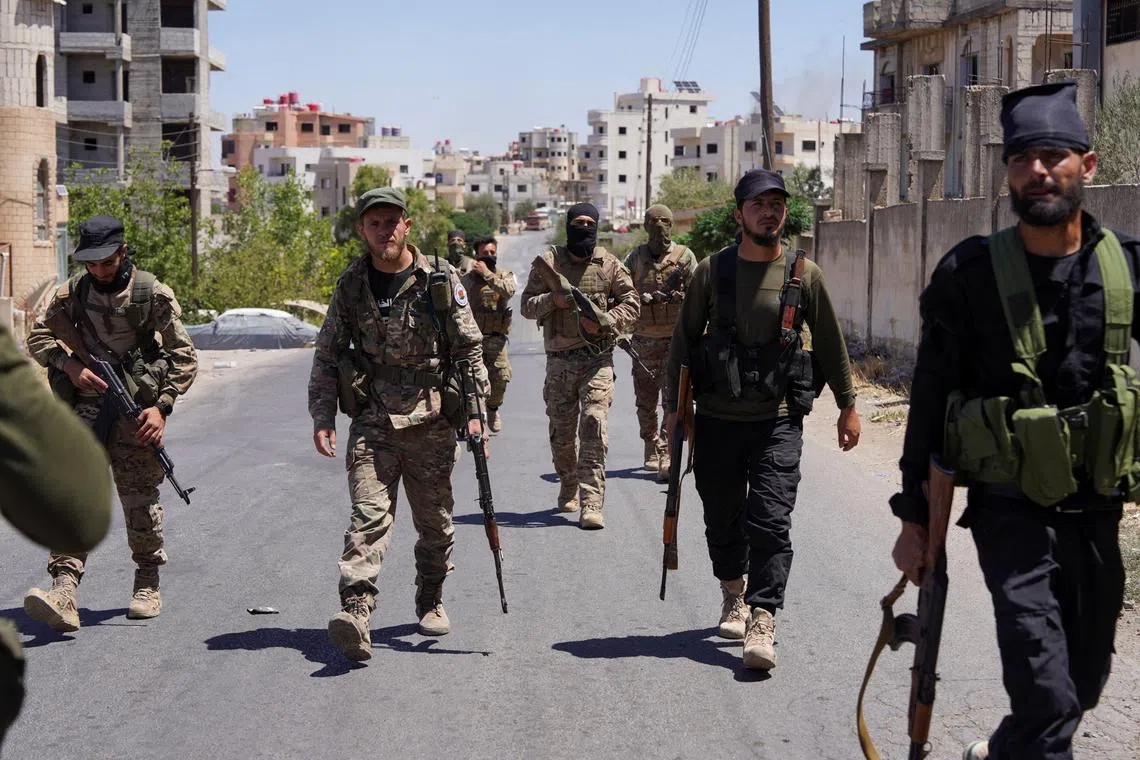Israel launches heavy airstrikes in Damascus, vowing to protect Syria’s Druze community
Sign up now: Get ST's newsletters delivered to your inbox

Smoke rising from a building following Israeli air strikes on Syria's defence ministry in Damascus, on July 16.
PHOTO: REUTERS
- Israeli airstrikes targeted Damascus, including the defence ministry, after Israel vowed to protect Druze communities in southern Syria from government attacks.
- Violence in Sweida, with reports of government forces looting and attacking civilians, prompted Israeli intervention following calls for Druze protection.
- Interim President al-Sharaa faces challenges in unifying Syria amid violence, with the US seeking calm and integration between all parties.
AI generated
DAMASCUS/JERUSALEM - Israel launched powerful airstrikes in Damascus on July 16, blowing up part of the defence ministry and hitting near the presidential palace as it vowed to destroy government forces attacking Druze in southern Syria and demanded they withdraw.
The attacks marked a significant Israeli escalation against the Islamist-led administration of interim President Ahmed al-Sharaa. They came despite his warming ties with the US and his administration’s evolving security contacts with Israel.
Describing Syria’s new rulers as barely disguised Islamic militants, Israel has said it will not let them move forces into southern Syria and vowed to shield the area’s Druze community from attack, encouraged by calls from Israel’s own Druze minority.
The US said the fighting would stop soon.
“We have engaged all the parties involved in the clashes in Syria. We have agreed on specific steps that will bring this troubling and horrifying situation to an end tonight,” Secretary of State Marco Rubio said on social media.
Syria said it welcomed efforts to resolve the conflict and called for the United Nations Security Council to “address the consequences of the Israeli aggression,” according to a letter seen by Reuters.
Scores of people have been killed this week in violence in and around the predominantly Druze city of Sweida, pitting fighters from the Druze minority against government security forces and members of Bedouin tribes.
Reuters reporters heard warplanes swoop low over the capital and unleash a series of massive strikes mid-afternoon. Columns of smoke rose from the area near the defence ministry. A section of the building was destroyed, the ground strewn with rubble.
A Syrian medical source said the strikes on the defence ministry killed five members of the security forces.
An Israeli military official said the entrance to the military headquarters in Damascus was struck, along with a military target near the presidential palace. The official said Syrian forces were not acting to prevent attacks on Druze and were part of the problem.
“We will not allow southern Syria to become a terror stronghold,” said Mr Eyal Zamir, Israel’s military chief of staff.
Mr Sharaa faces challenges to stitch Syria back together in the face of deep misgivings from groups that fear Islamist rule. In March, mass killings of members of the Alawite minority exacerbated the mistrust.
On July 14, Syrian government troops were dispatched to the Sweida region to quell fighting between Druze fighters and Bedouin armed men.
The troops ended up clashing with the Druze militias.
New clashes broke out in the city, according to a Reuters witness, after the Syrian interior ministry and a Druze leader, Sheikh Yousef Jarbou, said a ceasefire had been reached.
Sweida residents said they were holed up indoors.
“We are surrounded and we hear the fighters screaming... we’re so scared,” a resident of Sweida said over the phone.
Cracks of gunfire interspersed by booms could be heard in the background. “We’re trying to keep the children quiet so that no one can hear us,” the man added, asking not to be identified for fear of reprisals.
Syria’s health ministry said dozens of bodies, including fighters and civilians, had been found at a hospital in the city.
The Syrian Network for Human Rights said 169 people had been killed in this week’s violence.
Security sources put the toll at 300. Reuters could not independently verify the tolls.
Minority community
Druze, followers of a religion that is an offshoot of Islam, are spread between Syria, Lebanon and Israel.
Following calls in Israel to help Druze in Syria, scores of Israeli Druze broke through the border fence on July 16, linking up with Druze on the Syrian side, a Reuters witness said.
Israeli Prime Minister Benjamin Netanyahu said the Israeli military was working to save the Druze and urged Israeli Druze citizens not to cross the border. The Israeli military said it was working to safely return civilians who had crossed.
Israeli Druze man Faez Shkeir said he felt helpless watching the violence in Syria. “My family is in Syria - my wife is in Syria, my uncles are from Syria, and my family is in Syria, in Sweida, I don’t like to see them being killed. They are kicked them out of their homes, they are robbed and their houses burned, but I can’t do anything,” he said.

Syrian security forces walking together along a street in Sweida, Syria, on July 16.
PHOTO: REUTERS
On July 15, a Reuters reporter said they had seen government forces looting and burning homes and stealing cars and furniture in Sweida. One man showed the reporter the body of his brother who had been shot in the head inside their home.
A Syrian government statement on July 16 said those responsible for lawlessness in Sweida would be held accountable.
It said the government was committed to protecting the rights of the people in Sweida.
Mr Sharaa has repeatedly promised to protect minorities. REUTERS


